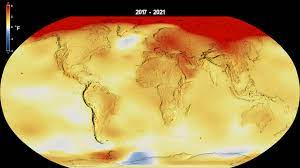The Copernicus Climate Change Service (C3S) has reported that each month since June 2023 has set new temperature records, resulting in a 13-month streak of unprecedented global heat. According to Carlo Buontempo, the director of C3S, this trend signifies a significant and ongoing shift in the climate. He emphasized that as long as humanity continues to emit heat-trapping gases, new temperature records are inevitable.
June 2024 saw the highest global average temperature for any June on record, breaking the previous high set in 2023. The first half of 2024 has been marked by extreme climate events, including scorching heatwaves in India, Saudi Arabia, the United States, and Mexico, as well as relentless rain causing extensive flooding in Kenya, China, Brazil, Afghanistan, Russia, and France. Wildfires have ravaged Greece and Canada, and Hurricane Beryl became the earliest category five Atlantic hurricane on record.
Julien Nicolas, a senior scientist at C3S, noted that the streak of record-breaking temperatures coincided with the El Niño phenomenon, which contributes to global warming. However, he clarified that El Niño was not the sole factor. Ocean temperatures have also reached new highs, with record sea surface temperatures observed in the Atlantic, Northern Pacific, and Indian Oceans.
The oceans, covering 70% of the Earth’s surface and absorbing 90% of the extra heat from rising climate-warming emissions, play a crucial role in influencing air temperatures and global average temperatures. June marked the 15th consecutive month of record sea surface temperatures, a significant milestone.
Looking ahead, the world is transitioning into a La Niña phase, which typically has a cooling effect. Nicolas anticipates that global air temperatures might decrease in the coming months. However, if sea surface temperatures remain high despite La Niña conditions, 2024 could potentially be warmer than 2023. Nonetheless, it is too early to make definitive predictions.
Over the 12 months leading up to June 2024, global air temperatures were on average 1.64°C above pre-industrial levels. While this does not mean the 1.5°C warming limit agreed upon in the 2015 Paris Agreement has been breached, it highlights the increasing likelihood of temporarily exceeding this threshold in the near future. Copernicus has indicated an 80% chance that Earth’s annual average temperatures will exceed the 1.5°C mark at least temporarily within the next five years.






